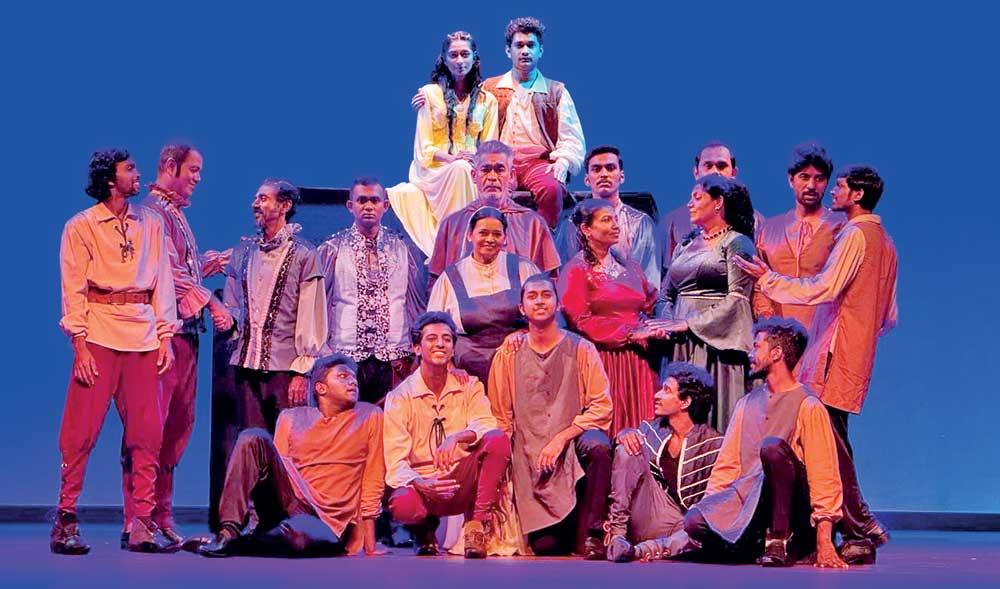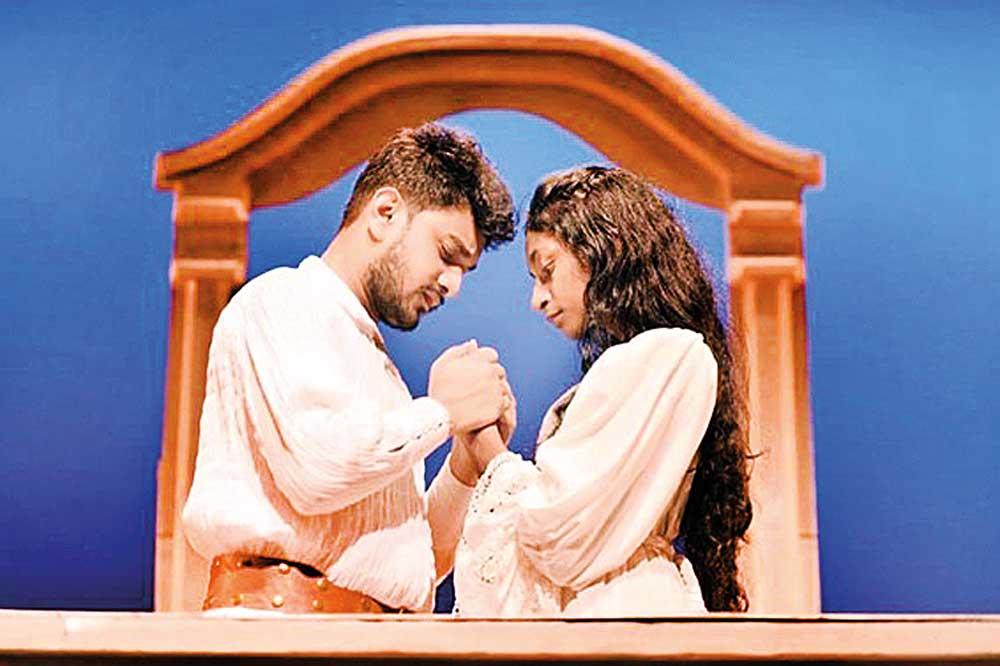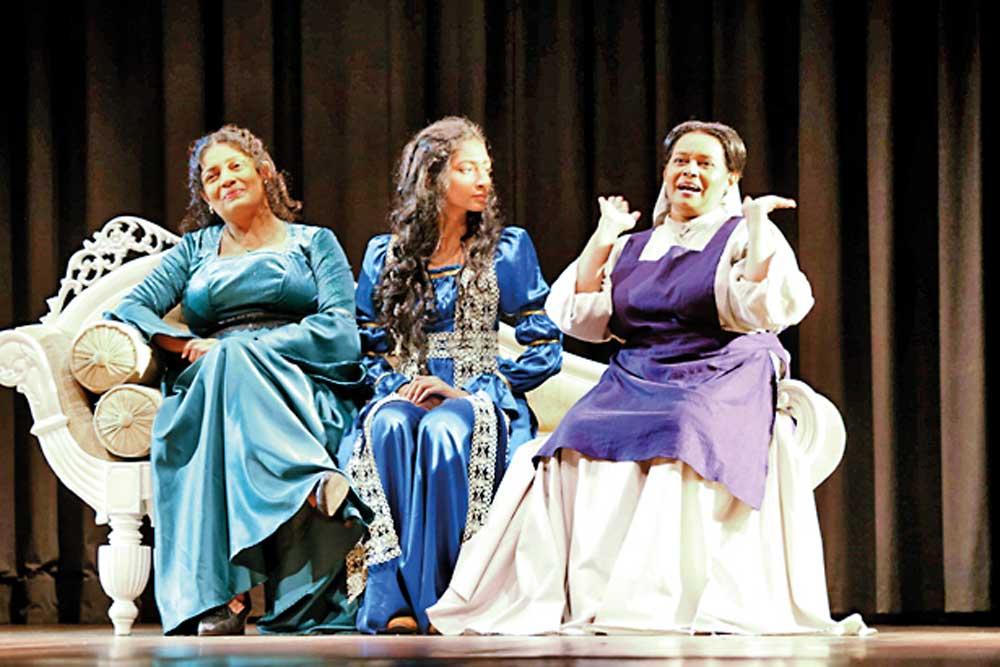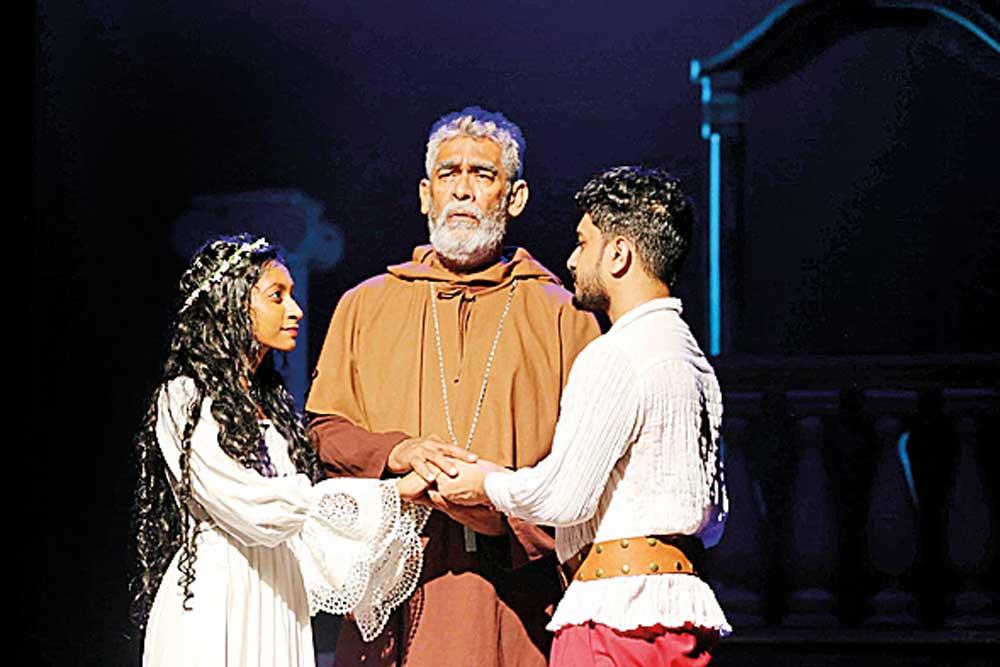19 Aug 2024 - {{hitsCtrl.values.hits}}

The cast

Romeo and Juliet played by Ramindu Beneragama and Omanthie Bandara
|
Romeo and Juliet is an apolitical play, which brings winds of fresh change to the Sinhala theatre; its message is that love is greater than all the power games played by rival dynasties, clans and the power hungry It is not a musical, though this production is almost that, with several songs and music composed by the talented Indika Upamali and lyrics by Vindhya Harankaha |
 Quite by chance, you see a billboard advert for William Shakespeare’s Romeo and Juliet while passing the Punchi Theatre. You are now out of touch with the theatre, the last few years having knocked you about too much. But old loves are rekindled in an instant. You walk in and buy a ticket at today’s inflated prices to see this Sinhala version of a classic play, perhaps the most famous of Shakespeare’s thirty eight plays.
Quite by chance, you see a billboard advert for William Shakespeare’s Romeo and Juliet while passing the Punchi Theatre. You are now out of touch with the theatre, the last few years having knocked you about too much. But old loves are rekindled in an instant. You walk in and buy a ticket at today’s inflated prices to see this Sinhala version of a classic play, perhaps the most famous of Shakespeare’s thirty eight plays.
As you walk in before the starting time of three thirty, the theatre lobby is swarming with schoolchildren. Sitting in the auditorium waiting for the play to start, you wonder how many of the ‘mature’ theatre-goers would turn up for the late evening show. You have seen large crowds for the cheap comedies staged here, all parking space taken up. How many would turn up to see a Shakespeare play?
How many, indeed, would have heard of Shakespeare? I remember a dramatist complaining twenty years ago that he meets people who haven’t heard of this most reputed of all playwrights. Given the bashing culture has taken since then, the above question is valid. The English theatre of Colombo, with Shakespeare as its principal icon, was dealt a mortal blow when Richard de Zoysa was killed in 1990. Shakespeare is staged in schools, both in English and Sinhala. But, as far as the wider, ‘mature’ audience is concerned, he is dead.
Dramatist Buddhika Damayantha made a Herculean effort against the current by staging Hamlet some years back. But, just as the dramas of Bertolt Brecht lost their appeal to our audiences with the rise of neoliberal politics and decline of old leftwing values, Shakespearean drama too, lost its cultural currency in a parallel downward cultural trend.


Stills from the play Romeo and Juliet directed by Jayanath Bandara
But, as the curtains open, you reason that this is precisely the reason for staging this play, and that’s why you are sitting here, feeling like a teenager with a fast beating heart. Just as Romeo and Juliet swam against the current in Shakespeare’s play – not simply against the established dynastic values and politics of mediaeval Verona, but against the harsh neoliberal mainstream values today where material success comes first and foremost.
Though the Sinhala theatre and its Colombo-centred English theatre are two distinct streams, Director Jayanath Bandara’s first stage production is an exciting cultural amalgam bridging both worlds. The director works fluently in both languages. This is important as anyone setting out to direct Shakespeare should be familiar with the original English texts, and/or theatre/film productions of it which are mostly in English.
He is also a veteran Sinhala stage actor, having played main roles in both Sinhabahu and Maname. This translation was done by his wife Vindhya Harankaha, who’s working on a PhD in Linguistics. Production costs were borne by Wasana Bandara. Even so, the stage settings were minimalist, quite understandable in these times when a lavish set would cost as much as a new house.
On the other hand, the costumes were lavish and splendid. You can’t scrounge on that for a Shakespeare play. Romeo and Juliet is about the high society of Verona, and actors must dress accordingly. The Director’s skill is evident in the handling of actors. This play has a large cast, and he has used both stage veterans as well as newcomers and amateurs.
Overall, the acting is excellent, and they all look the part with just one exception. Romeo is played by two actors (for the 3.30 and 6 p.m. shows respectively), Ramindu Beneragama and Sudarshana Krishantha. In this performance, Ramindu Beneragama looks too chubby for the part. Romeo down the ages has been played by lean, fit looking actors in both stage and film.
Juliet is played by Omanthie Bandara, and she carries the role well, able to produce that starstruck sparkle in the eyes when required. The key characters are played by people with plenty of acting experience. Malee Jayaweera as the nurse has that right mixture of bawdiness and rustic wisdom, and brings to mind the nurse in Franco Zefirelli’s splendid film version of Romeo and Juliet.
Chaminda Batukotuwa and Nihari Somasiri playing Lord Capulet and Lady Capulet fit their roles with ease, as do Wasantha Gunawardhane and Silumini Alagiyawanna playing Lord Montague and Lady Montague (Wasantha is the son of dramatist Dayananda Gunawardhane). The rest of the cast, including the key figure of Friar Lawrence (Thimira Udalamaththa) play their parts very well, transporting us in time and space. But, Tharindu Madushanka playing Mercutio is exceptional. In fact, he is the best Mercutio I have seen in any production from any part of the world.
Romeo and Juliet is not a musical, though this production is almost that, with several songs and music composed by the talented Indika Upamali (lyrics written by Vindhya Harankaha). Zefirelli used a song (What is a Youth) to haunting effect in his film version, where an itinerant minstrel (singer) walks into the Capulets’ Ball and starts singing the song which was later made famous as ‘A Time for Us’.
Jerome de Silva’s nuanced choreography adds another dimension to the production.
In this production, the Ball was staged with great effect, including the Morisca dance into which Zefirelli intercut close ups of Romeo and Juliet so effectively. In the theatre, close ups aren’t possible. Instead, we are drawn irresistibly towards the characters if it works. For many, it’s the balcony scene in this play which provides the best moments. For me, it’s the Capulets’ Ball, when the two lovers discover each other, and an awestruck Romeo mutters as he sets his eyes on Juliet:
“O, she doth teach the torches to burn bright!
It seems she hangs upon the cheek of night
Like a rich jewel in an Ethiop’s ear;
Beauty too rich for use, for earth too dear!”
These words are magical in any language. Sri Lankan theatre is highly politicised. This is not a criticism, but a marginal comment on how things are. Undoubtedly, this leaning towards political satire is a necessity brought about by our society, constantly battered and betrayed by amoral politics. I have seen some good theatre over the years, but no magic.
But that evening, I walked out of the auditorium having experienced that magic, thanks to a hard working director, cast and crew keen to bring Shakespeare to the Sinhala stage. Romeo and Juliet is an apolitical play, which brings winds of fresh change to the Sinhala theatre. Its message is that love is greater than all the power games played by rival dynasties, clans and the power hungry.
27 Dec 2024 11 minute ago
27 Dec 2024 15 minute ago
27 Dec 2024 19 minute ago
26 Dec 2024 9 hours ago
26 Dec 2024 26 Dec 2024